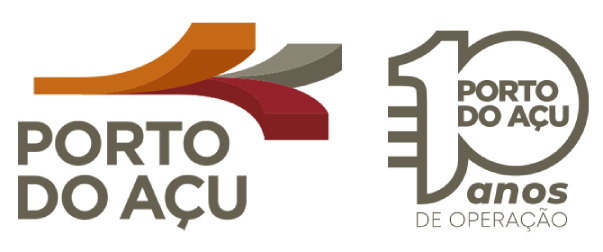Prumo released today its third-quarter earnings and reported a fourth consecutive quarter with positive Ebitda (earnings before interest, taxes, depreciation, and amortization). In the July-to-September period of this year, the company reported R$55.2 million Ebitda, due primarily to increased revenue from the beginning of its take-or-pay contract with Anglo at the end of 2014 and thanks to new rental contracts in the cargo handling area at Porto do Açu.
“With more than 150 vessels received this year at Porto do Açu, the beginning of operations at the Multicargo Terminal (T-MULT), and the new commercial contracts and partnerships signed throughout the year, we are celebrating a new phase for Prumo. Porto do Açu will intensify its activities in 2016 with the start of operations at its oil terminal, maritime fuel distribution activities, and the start of operations of the biggest offshore supply base in the world,” says Eduardo Parente, CEO of Prumo.
Highlights
Among the highlights for the quarter are the signing of a contract with Votorantim Metais to handle bauxite and pet coke at the Multicargo Terminal (T-MULT) at Porto do Açu. The first operation with bauxite took place in August of this year, and the second was concluded on Oct. 29, with a total of 75,000 tonnes of bauxite loaded during these two operations.
Prumo also signed a contract with the German company Oiltanking for the sale of 20% of its Oil Terminal (T-OIL) at Porto do Açu for US$200 million. Oiltanking also will be responsible for operations at T-OIL. The terminal is licensed to handle up to 1.2 million barrels of oil a day, with the capacity to receive VLCC (very large crude carriers) type vessels. Initially, oil transshipment operations will be carried out from specialized tanker ships to conventional ships, reducing the export freight costs by as much as 60%. The operation will be carried out in a sheltered area and with the use of oil containment booms, which allows for safe operations year round.
In addition, Porto do Açu Operações (a wholly owned subsidiary of Prumo) signed a Management Contract with OSX CN that allows Porto do Açu to manage the commercial use of the area occupied by OSX CN at the Açu port complex. The contract, which included the intervention of Caixa Economica Federal, gives exclusive rights to Prumo to prospect new investors willing to install ventures geared towards or related to the shipping industry.
Another highlight is the lengthening of the company’s short-term debt with the signing of agreements with Bradesco and Santander banks to transfer BNDES financing of approximately R$2.3 billion. The financing amount will be wholly used to liquidate bridge-loans previously provided by BNDES. The financing has a maturity of 18 years, with a four-year grace period and 14-year amortization period. The remaining R$500 million of the R$2.8 billion approved by the BNDES, earmarked for investments to conclude construction at the port, will be transferred by a third bank that has yet to be defined.
In addition, in October Prumo carried out talks with an affiliate of the Canadian group Brookfield for the subscription of US$200 million in debt issued abroad by the company. The debt securities were issued by Prumo Participações e Investimentos, a wholly owned subsidiary of Prumo Logística. The debt securities mature on Sept. 30, 2022, with a coupon of 8.50% and an amortization timetable with quarterly payments of interest and principal, with the first interest payment set for Dec. 31, 2015 and the first payment of principal on June 30, 2016.
During the quarter Prumo also announced that it decided not to go ahead with the signature of definitive contracts to develop the Gas Hub at Porto do Açu which was set out in the Memorandum of Understanding signed with Bolognesi. However, the company informed that it continues to move forward with studies and negotiations related to the Gas Hub, especially because of the competitive advantages Porto do Açu offers due to its location and already-existing infrastructure.
Earnings
In the July-to-September period of this year, R$282 million were invested in Porto do Açu (not including interest on capital), with R$59.7 million coming from Ferroport and Anglo American and R$222.3 million from Prumo (through its subsidiaries Porto do Açu Operações and Açu Petróleo S.A.) – excluding the amount invested by Prumo in the breakwater of T1, already accounted for in Ferroport capex.
Of the total R$282 million invested, R$30.1 million went to the construction of the breakwater, R$18.5 million for dredging, and R$100.2 million towards the Oil Terminal (T-OIL), all in Terminal 1. At Terminal 2, R$20.9 million were invested in the T-MULT, R$25.1 million in the breakwater, R$64 million in infrastructure construction projects, and R$17.1 million at BP Prumo, among others.
Between 2007 and September 2015, approximately R$10.3 billion were invested in Porto do Açu (including interest on capital). Of this amount, R$3.9 billion were invested by Ferroport and Anglo American, and R$6.4 billion by Prumo. Prumo’s estimated capex for all of 2015 is of R$1 billion.
During the third quarter of 2015, net consolidated revenue was R$102.7 million. The verified increase in comparison with the same period in 2014 is due primarily to the new contracts signed at the end of 2014 and during 2015, and the start of Ferroport operations in October 2014. Just the net revenue from the take-or-pay contract signed with Anglo totaled R$75.1 million.
The company ended the third quarter with a balance of cash and cash equivalents of R$96.8 million, and with net debt of R$3.3 billion, including interest and currency adjustments. With the refinancing of its debt with Bradesco, Santander, and BNDES, the short-term financial debt was fully lengthened into the long term. As a result, the company’s earnings in the next quarter will already reflect this operation.
The consolidated net financial result for the quarter was negative R$95.9 million, impacted by the start of operations seeing as how part of financial expenses ceased to be capitalized and began to pass through to earnings. Financial expenses were R$118.4 million, consisting mainly of interest, brokerage, and currency fluctuations. Financial revenue was of R$22.5 million, consisting primarily of interest on loans, revenue from financial investments, and interest. The net loss was of R$36.7 million.
About Prumo
Prumo Logística develops and operates Açu Port. The company offers infrastructure solutions for the oil and gas industry, as well as areas for companies in the maritime and industrial sectors to install facilities at Açu Port. Prumo has been controlled by EIG Global Energy Partners since 2013.
Located in São João da Barra, Rio de Janeiro state, Açu Port began operations in 2014 and serves the sector’s leading companies with excellence in safety. Açu Port includes a total area of 90 km2, spread across two terminals: Terminal 1 (T1 – offshore terminal) and Terminal 2 (T2 – onshore terminal).
T1 is dedicated to loading iron ore and petroleum, with berths built along a 3 km quay and which can receive ships with draughts of up to 24 meters. Operational since October 2014, the terminal has already received more than 40 iron ore ships for Anglo American. The companies have a 50-50 joint venture called Ferroport.
T-OIL, which will begin operations in August 2016, will have the capacity to move 1.2 mbpd, receiving Suezmax and VLCC ships. Recently, the company signed a 20-year contract with BG for the transshipment of oil, with average volume of 200 kbpd. T1 also includes an oil-storage project and other onshore oil services.
T2 is a terminal built around a shipping canal that is 6.5 km long, 300 meters wide and up to 14.5 meters deep. Technip, NOV, InterMoor and Wartsila are already operating at T2. The Multicargo Terminal (T-MULT) began operations in July with the shipment of bauxite for Votorantim, and the first ship left the terminal on September 22. Edison Chouest Offshore (ECO), which is building the world’s biggest offshore support base at the port, already signed a contract with Petrobras to operate 6 berths at its terminal. In addition, BP and Prumo created a 50-50 joint venture to sell marine fuel to ships using the port.
Prumo also created the RPPN Fazenda Caruara Private Nature Reserve, the largest private reserve of restinga scrub forest in the country, with an area of 40 km2. Açu Port currently employs close to 10,000 people, with 3,500 of those already in the operational area. When in full operation, the estimate is that Açu Port will generate close to 40,000 jobs.

